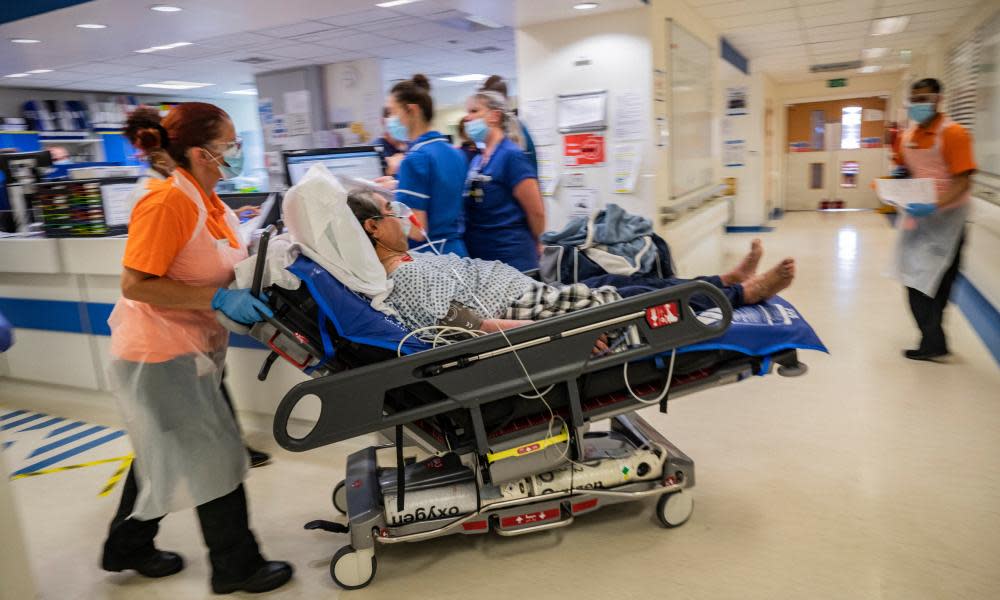Record 5.7m people in England waiting for hospital treatment

The number of people waiting for hospital treatment in England has hit a record high of 5.7 million, as the NHS struggles to clear the growing backlog of care worsened by the pandemic.
The waiting list is rising by about 100,000 a month as more people who did not seek, or could not access, NHS treatment over the past 18 months visit a GP and are referred to hospital.
Related: NHS ‘needs £10bn annual boost’ to tackle backlog and Covid cost
Meanwhile, accident and emergency departments treated more than 1.39 million patients in September – the highest number recorded for the month, according to figures from NHS England.
Prof Stephen Powis, the NHS national medical director, said: “There is no doubt the NHS is running hot, with the highest-ever number of patients seen in A&E in September – 14 times as many Covid patients in hospital compared with the same month last year and record 999 ambulance calls.”
Waiting lists for procedures such as a hip or knee replacement or cataract removal continue to grow. At the end of August, 5.7 million people were waiting to start treatment, according to the NHS England data. This is the highest number since records began in August 2007.
The number of people having to wait more than 52 weeks to start treatment was 292,138 in August, down from 293,102 in the previous month but more than double the number waiting a year earlier, in August 2020, which was 111,026.
Senior doctors said the figures, published on Thursday morning, were alarming.
Dr Tim Cooksley, the president of the Society for Acute Medicine, said: “This data presents a worrying picture as we are moving further away from an NHS that can provide the best possible care to all who need it promptly and closer to one which can only focus on those most critically unwell.
“Even then it is with a threadbare workforce that has been run into the ground, and there is widespread concern about winter given the NHS was in a weak position heading into the pandemic and is now rebuilding on the back foot.
“There is no doubt this raises safety concerns and, sadly, many people will be waiting longer for their care and it will not be delivered to the standards they should expect as services struggle to contend with workload.”
Almost 370,000 patients in England had been waiting more than six weeks for a key diagnostic test in August.
A total of 369,086 patients were waiting for one of 15 standard tests, including an MRI scan, non-obstetric ultrasound or gastroscopy. The equivalent number waiting for more than six weeks in August 2020 was 472,517, while in August 2019, before the pandemic, there were 42,926.
Health leaders warn demand for care is still increasing rapidly across the NHS.
A poll of 170 leaders from 119 trusts, also published on Thursday, reveals significant concerns about access to care. NHS Providers, which represents health trusts and conducted the survey, has warned that clearing the backlog of care caused by the pandemic could take years.
Saffron Cordery, the deputy chief executive of NHS Providers, said: “Trust leaders are fighting fires on multiple fronts as they try to recover care backlogs, deal with increased demand for emergency care, treat patients with Covid-19 and prepare for what is likely to be the most challenging winter yet for the NHS.
“In a matter of weeks, we will face our first winter where both flu and Covid are in circulation. NHS staff are doing all they can to bear down on the care backlog – but the reality on the frontline is that even a small increase in flu, Covid-19 admissions or emergency care attendance will really increase the pressure on the service.”

 Yahoo News
Yahoo News 
